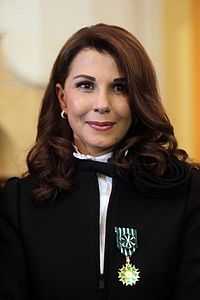Majida El Roumi
| Majida El Roumi | |
|---|---|
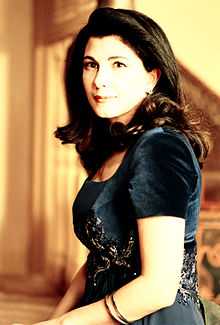 Portrait of Majida El Roumi in 1996. | |
| Background information | |
| Native name | ماجدة الرومي |
| Birth name | Majida Halim El Roumi Baradhy |
| Born | 13 December 1956 |
| Origin | Tyre, Lebanon |
| Genres | Arabic, classical, opera |
| Occupation(s) | Singer, lyricist, actress |
| Instruments | Vocals |
| Years active | Early 1970s–present |
| Website | Majida El Roumi Official website |
Majida El Roumi Baradhy (Arabic: ماجدة الرومي برادعي; born December 13, 1957) is a Lebanese soprano. Since her first appearance on television, she became one of the most successful singers of the Arab world, as well as a UN Goodwill Ambassador.
She was first recognized in 1974 when she participated in the talent show "Studio El Fan" on Télé Liban and performed songs for Asmahan and Layla Murad at the age of 16. She is commonly known in the Arabic region as "The Angel of Arabic Music" and "The Artist of Elites".
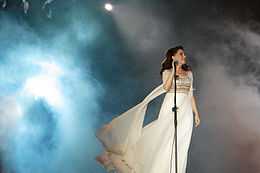
Biography
1957-1970s: Early life and career beginnings
Majida El Roumi Al Baradhy descends from “Al Baradhy” family from Tyr, South Lebanon. Her grandparents used to work on houseboats and travel to the lands of “Rûm”; that’s how they got their name at the time. Majida was born on December the 13th in 1957. She is also the daughter of the great Lebanese musician Halim El Roumi[1] who was born in Tyr in 1919 and moved to Haifa in Palestine at the age of 2 with his whole family due to the crisis of World War I.[2] When Halim moved to Egypt to follow his musical career, he met Marie Loutfy, a Melkite Greek Catholic woman. They got married in Port Said and had three girls Maha, Mona, Majida and a boy Awad. The whole family moved from Egypt to Kfarshima in south Lebanon when Majida was at the age of 6 as she grew up in an artistic environment and family of artists. Kfarshima is also home to many Lebanese singers, musicians and poets like Philimon Wehbe, Melhem Barakat and Issam Rajji.[3] The residence of Halim El Roumi was a meeting place for many cultural figures as he worked with many singers with mentioning his discovery to many well-known artists, mainly the Lebanese star Fairuz.[4]
As a child, Majida used to listen to the works of Fairuz, Umm Kulthum, Mohammed Abdel Wahab, Wadih El Safi and Asmahan and her musical talents started to appear at the age of 5 when she sang her first song “Miladak” (Your Birth) in reference to the birth of Jesus Christ and dedicated to her brother on his birthday.[5] Her vocal abilities attracted the attention of her family and neighbors, and she was featured in her school’s stage in Saint Coeur, Al Hadath. At the age of 14 she accompanied her father in an interview on Télé Liban with Najib Hankash when she firstly performed songs for Umm Kulthum and Fairuz. At the age of 16, Raymond Safadi, Majida’s cousin, noticed her musical capabilities and thought that she should pursue singing as a profession. She participated in the talent show Studio El Fan in 1974 after she sneaked out of the house with her brother and her cousins. From her first appearance on television, she performed for Layla Murad and Asmahan and knew a distinguished success and won the gold medal for oriental singing.[6]
Her fame spread in no time across Lebanon after the show and the reviews were so good they made her father change his mind and give her his blessings to pursue in singing as long as she continues her higher education. Later on, Majida graduated from the Lebanese University after receiving her BA in Arabic Literature. In 1975, Majida released her first single “Am Behlamak” (Im dreaming of you, Lebanon) with collaboration with Lebanese poet Said Akl and musician Elias Rahbani. The song made a huge spreading in Lebanon as it kicked off with the outbreak of the Lebanese Civil War in April 1975.[7]
After releasing her first album Wadaa (Farewell) in 1976, Majida got the attention of well-known Egyptian filmmaker Youssef Chahine. She starred alongside Hisham Saleem in her first and only movie Awdat Al Ibn Al Dal (The Return of the Prodigal Son) and performed three soundtracks for it.[8][9] Chahine introduced her as the Voice of the 20th Century and she received the “Egyptian Critics Award” after it.
In 1977, Majida married Antoine Dfouni, a businessman from Byblos, Lebanon, who also became her manager. They had two daughters: Hala and Nour. Majida didn’t think of her marriage as an obstacle for the debut of her career, but she considered it a guarantee and support for a successful one.
Musical career
The 1980s-The 1990s
After the success of the movie across the Arab World in 1976, Majida said that Youssef Chahine introduced her to the Arabic mass in the finest image she could get in the world of performing arts at the time. Her first concert ever performed was in Carthage in Tunisia in 1980.
In 1982, she started performing long shows in Lebanon and gave monthly concerts in several stages such as Georges V and Piccadilly Theatre (Beirut) in Hamra Street. Later on, she gathered some of her most famous hits performed in an album “Live Recordings 1982” which took its place in the Arabic music industry, noting here her song titled "Zikrayati" (My Memories) with a new adaptation of Malagueña Salerosa, a well-known Son Huasteco or Huapango song from Mexico, performed by many international artists such as Nana Mouskouri, Antonio Aguilar and Yanni. In 1983, Majida gave birth to her first daughter Hala. As a mother she chose to welcome her newly born child by recording some songs for children in a single studio album that she released in the same year.
She started collaborating with some of the most famous Arabic composers and poets such as Ihsan El Monzer, Rahbani Brothers, and Zaki Nassif, she also sang some of her father’s compositions like "Salawna" (We Let Go) and "La Taghdabi" (Don't Be Mad). In 1987, Majida performed "Al Touba" originally by Abdel Halim Hafez. The version got the attention of the Egyptian people real fast and became very famous that she joined it to her album "Dawi Ya Amar" (Moon So Bright) released in the same year. She was asked to perform many concerts in the 1980s but she had to cancel many of them due to the circumstances of the Lebanese war that cut the exchanges of arts between both countries by force. In 1988, "Ya Saken Afkari" (O Resident of My Thoughts) studio album was out. Zaki Nassif composed a very specific song called "La Ma Fiyyi" (No, I cannot) that was dedicated to a friend of Majida who died during the Lebanese war in the 70s and she performed it many times live on stage. It is considered from the hardest songs ever released by her and it extends to more than 2 octaves and Majida hits her highest note ever in studio recordings, C#6. By then, Majida stated that poets were giving her variety of poems to sing without focusing on any specific subject, but her only condition to record or perform any song was to react with its meanings and the feelings she should give it or else she wouldn't. She was much known for her hard compositions and their wide range with very smooth operatic parts, as she was from the first and rare Arabic artists to introduce these styles of singing into the music field after Asmahan and Layla Murad.
When she performed at Hunter College in May 1989 accompanied by a 19-piece orchestra, music reviewer Peter Watrous said: "she wandered between near-European pop and Middle Eastern pop".[10] She also had her own musical orchestra to accompany her during her live concerts and recitals conducted by Abdo Monzer, but considered in parallel that being a successful artist comes with building a bright and loving family that needs to be raised well as much as delicate is to have a career to be taken care of.
After her concert at Carnegie Hall in USA, Majida was also invited to sing in Carthage again and to perform in a tour in the US in the summer of 1990, but it was impossible for her team to be gathered to return to Lebanon in the end of the year due to the bad situation in Lebanon during the war, they had to stay in Nicosia, Cyprus to practice for new concerts that were rescheduled among them a concert in Place des Arts in Montreal, Canada. El Roumi also said that her peace message and her humanitarian beliefs haven’t changed from what she’s ever believed in, she considered herself very lucky to pull off such successful shows during the unstable periods that Lebanon was facing by the end of 1990 also didn't miss the change of expressing that she believed that the war stopped her from making some of her dreams and ambitions come true.
Majida noted the importance of Beirut as her home city and the Lebanese capital during her career and especially in 1990 when she first sang from the poetry of Syrian poet Nizar Qabbani her patriotic “Beirut, Sett Al Donia” (Beirut, Lady of the Universe) and composed by Dr. Jamal Salameh. She considers Beirut a part of who she is and a part of every concert she hosts during her career, she sings for Beirut as she sings for love and for humanity anywhere in the world with all her pride as Lebanese.

In 1991, Majida released "Kalimat" (Words,كلمات), her first pan-Arab hit, under the Music Master label. The title song was written by Syrian poet Nizar Qabbani and composed by Ihsan El-Mounzer, the song made a remarkable success that Majida still performs it today on stage in every concert. Among the album tracks, another patriotic remark by Qabbani was "Beirut, Set EL Dounia" (Beirut, Lady Of The Universe) composed by Jamal Salameh. It is written as a confession and an apology from the Lebanese people to what they have done through wars and political issues to their precious city. In this track, the melody includes a revolutionary spirit and ends in an operatic way in which Majida hits the high B5. The album also included another patriotic song by Elie Choueiry "Kollon Youghanni Ala Laylah" (Everyone Is Singing On His Way) and cooperated with Lebanese composer/songwriter Melhem Barakat in "Ent w Ana" (You and I) written by Illia Abou Chedid, with a hint of oriental through the melodies and combining between classical and oriental styles. The album also included "Esma' Albi" (Listen To My Heart) originally interpreted by Halim El Roumi with a new adaptation and "El Iyyam" (Days) composed by Abdo Monzer. Majida initiated the movement that re-popularized classical Arabic poetry in music and began to fuse East and West. "Kalimat" (Words) made a huge success, it was the first and only Arabic album to be awarded a Platinum album selling record two times at that time.
Later in the 90s, exactly in 1994, "Ibhath Anni" (Look For Me) followed the template set by "Kalimat" was Majida's seventh released album. The title song is classical written by Lebanese well-known poet Ounsi el-Hajj and composed by Abdo Monzer. It is an operatic strings themed song about a lady calling for her beloved to search for her, and look for their love everywhere to find her. Poet Habib Younes gave Majida two poems "Lan A'oud" (I Won't Come Back) and "Ghanou Ma'i Lel Hobb" (Sing Along With Me For Love), both composed by Jamal Salameh, who also composed a poem from the late Nizar Qabbani titled "Al Jarida" (With A Newspaper) which made a wonderful success as it was a mix between oriental rhythms and western that it was full of energy with an orchestral intro that passed two minutes. Majida performed this song several times on stage including in the Cairo Opera House and on the stage of Olympia (Paris) in 1998. Elie Choueriy composed two patriotic tracks in this work: "Oum Thadda" (Stand Up And Challenge) from his own lyrics and "Saqata Al Qina'" (The Mask Has Fallen) written by award winning Palestinian poet Mahmoud Darwish. Both songs were once again a true message for freedom to Lebanese people to stand to what they believe in and defend their country from falling into political issues. Souad Al Sabah's "Kon Sadiqi" (Be My Friend) was about empowerment of women, and a message to being equal with men. The work also included two tracks composed by Halim El Roumi: "Mararti Fi Khayali" (You Passed In My Fantasy) written by Fouad Slaiman and "Ya Mkahel Remshak" written by Abdel Wahab Youssef. The album knew such success with its music and compositions: it has piano solos, string movements, wide orchestration especially in "Al Jarida" which was and still her longest song ever recorded.
In 1996; Majida signed with the Saudi label Rotana and released "Rasa'el" (Letters). Elie Choueiri composed the opening title "Samra El Nile" (The Brunette Of The Nile) written by Georges Jerdaq, a song for Egyptian women and "Aynaka" (Your Eyes) by Anwar Salman and composed by Jamal Salameh blurred the line between classical and Arabic music. Songs like "Shou3oubon Men Al Oushaq" (Nations Of Lovers) by Joseph Khalifeh from Onsi El-Hajj's poetry, in which she hits a high A5, and "Lawen Ma'i El Iyam" (Color Days With Me), in which she hits a high C6 with ease in Staccato technique, employed Majida's operatic skills to hit more than two octaves in both songs. "Hobbouka" (Your Love), written by Anwar Salman and "Baddi Ellak" (I Want To Tell You) by Henri Zougheib, evoked songs from Eastern Europe with a rhythmic melody and western instruments both composed by Jamal Salameh. Majida also performed "Ma Rah Tekhlas El Hkayi" (The Story Will Not End) from Elie Choueiry during many events mentioning in Jerash (1996) as a message of freedom under the March (music) style. Through "Qana", from Henri Zougheib and composed by Elie Choueiry, released as a response on the Israeli massacre during the South Lebanon conflict (1982–2000), Majida presented a clear Lebanese message to the whole world, a message that was stronger than any other political or diplomatic letter in which she affirmed that Lebanon would always be ready to fight for its rights and lands and would never give in and accept any kind of humiliation and disregard. The song was powerful with meanings which led the Israeli Embassies in some Arab capitals to protest and requested seizure of broadcasting. On the other hand, Majida's father composed "Mimi", by the Rahbani Brothers, in honor of Majida's elder daughter, and "Shou Bheb Eshar W Koun Andilak" (How Much I Love Satying Up At Night To Be Your Lantern) was given by Elie Bitar with melodies from Joseph Khalifeh, in addition to a single track by Abdo Monzer called "Min Lamma Tla'ayna" (From The Moment We Have Met), written by Rafiq Rouhana; these tracks showed a classical side in the album among all the other musical styles which proved a change in Majida's choice of songs comparing it to her oldies.
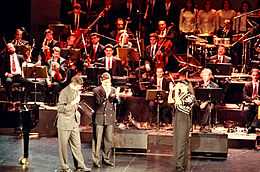
Majida El Roumi released her ninth official album in 1998, titled "Ouhibbouka Wa Ba'd" (I Love You And More), working in the title song with Saudi Arabian poet Al Nasser and composer/singer Abdel Rab Idriss, who produced also produced it. "Tawq Al Yasmin" (Jasmine Necklace) marked Majida's fourth collaboration with Qabbani and her first with Iraqi singer/songwriter Kadim Al Sahir. The song showed once again her operatic abilities to the high C6, it also had difficult music combining between tango style and oriental, mostly in the Kanun parts along with strings, not to forget a simple French interference from Charles Aznavour's Les Deux Guitares, that majida chose to take a paragraph and sing it as background for the song. Jamal Salameh composed three songs, "Al Qalb Al Maftouh" (The Open Heart) written by Lebanese journalist, the late Ghassan Tueni, as a letter to the beloved on the day of his open heart operation, "Inta El Madi" (You Are The Past) from Henri Zougheib's poetry with a strong belting on D5 at the end as a scream for refusing the comeback of her abandoned love. "Sayedi El Ra'is" (Mr. President), which was written by Henri Zougheib in collaboration with Habib Younes, in the form of a letter to the president reclaiming freedom and reject all faces of traitors who threaten peace and stability in the country. This track was so powerful, members of the government in a certain Arabic country had to gather for a meeting to discuss the poem's meanings and get the true message from it then permit its broadcasting on televisions. Jamal Salameh also arranged "Al Yawm Aada Habibi" (Today, My Beloved Returned). It is a waltz duet with her father who composed it and written by Abdel Jalil Wehbi. Al Nasser also gave Majida "Yaqoulou Inni Mra'atoun" (He Says I Am A Woman). This song again showed Majida's operatic skills by hitting a high G#5 with a hard orchestration including classical strings, harp and piano from Abdo Monzer's compositions who composed "Ana Lama Bwardi Tmasini" (When You Bring Me A Rose).
2001-2004
In 2001, Majida El Roumi released a single titled "Nachid El Hobb" (The Hymn Of Love) with lyrics from Dam'a wa Ibtisama (A Tear and A Smile) written by the Lebanese artist and writer Gibran Khalil Gibran. El Roumi chose this text after the UN ceremony in 2001, when she was named Goodwill Ambassador, and declared it to be the theme message for her mission of peace around the world. 2001 was also the year Magida's sister Maha had to be transported to USA for better medical care, as she was suffering from cancer.[11] Regrettably she died on July same year. This unfortunate event saddened Majida deeply and affected her for a long time.
"Erhamni Ya Allah", "Cithare Du Ciel"
In addition, Majida released in 2003 two religious albums. The first one was titled "Irhamni Ya Allah" (Have Mercy On Me, O God), and Joseph Khalifeh composed all 12 tracks. Title song was taken from Psalm 51, as well as "Radita" (Satisfied) from Psalm 85, with a gentle call for God to enforce humans with his mercy and blessings. Majida also sang inspirational words from the Bible under the title of "Li Ajli Kalimatika" (For What You Say). She also dedicated songs for Lebanese Saints: Charbel Makhluf called "Charbel" also known as "Ya Ghafi Wa Oyounak La 'Inayna Nour" (O Sleeper And Your Eyes Are Our Light), Father Nematallah Hardini in "Ya Bouna Nematallah" (Our Father Meamtallah) both written by Henri Zougheib, and sister Rafqa Pietra Choboq Ar-Rayès in "Rafqa" written by Majida herself. In this work, clam tunes and relaxing music takes listeners to a new dimension full of prayers and blessings specially in the mentioned numbers also in "Mariam Je'tou Ouhayiki" (Mary, I Have Come To Salute You), from Majida's lyrics, "Men Atm El Iyyam" (From The Darkness Of Days) and "Fi Hatha El Masaa" (This Evening) both written by Fadi Al Rahi. Church Organ, Piano, Strings and many other instruments marked this work as one of the finest albums through its arrangements. Fadi Al Rahi also inspired words for writing a track number at the end of the album titled "Maha" as a salute to Majida's sister's soul wishing for it to rest in peace. The song is so emotional, Majida always performs with high sensitivity and grace during live recitals.
The second album is titled "Cithare Du Ciel" known as "Kitharat Al Samaa" (The Sky's Sitar) with all songs composed by Pierre Basbous. Title song was written by Majida herself as a call for the Virgin Mary, describing her as the Sitar of the sky, while the opening track is "Al Salam Aalayki" (Hail Mary) taken from the Catholic prayer asking for the intercession of the Virgin Mary, the mother of Jesus. Majida also sang a special rendition of the Latin version "Ave Maria an opera piece with wonderful orchestration in which Majida hits a high A5. This showed Majida's operatic abilities as a Soprano with ease in vibrato. "Ya Ilah El Khayr" (God of Good) is taken from the Maronite Mass, "Ya Sayidat Al Entisar" (O Lady Of Victory) written by Majida herself and "Al Abana" (Our Father) from the Lord's Prayer also marked Majida's techniques in classical style specially in a French version of "Miserere mei, Deus" (Have Mercy On Me, O God) from Psalm 51 in which she hits the high G#5.
2006: The Comeback with "E'tazalt El Gharam"

After almost 8 years without releasing an album, Majida’s fans were surprised by Etazalet El Gharam (I Quit Love) which spoke to a younger audience. The album was released in 2006 under the ‘’Good News 4 Music’’ productions. It peaked the top rankings in the charts from the release day and stayed top 1 several weeks; it was also seen in the top 20 after four years from its release. The work is still selling well after six years, and a new copy by EMI Music is now selling out after the previous label was sold out. New styles, new orchestration, simpler lyrics and the large variety in music were present in this work in which Majida showed a youthful spirit in her songs. The title song was written by Noha Najem, poem reviewed by Nizar Francis and composed by Melhem Barakat. It made a huge success across the Arab world and it made the top rankings on Arabic radio stations and televisions from its release date, it also had a two minutes introduction arranged by Jean-Marie Riachi who put a lot of saxophones and strings into it which gave it a jazzy, rather oriental, style. It was later released as a video clip directed by Nadine Labaky with dancers from the Caracalla Dance Theatre by Elissar Caracalla’s choreography. First track titled "Ouhebouka Jeddan" (I Love You So Much) was taken from Nizar Qabbani’s poetry and composed by Marwan Khoury. The song spoke more to the youth with frequent uses of percussions and drums which showed a nice touch of Majida’s new in this work. The song ends with an 18 seconds breath (10 flat seconds on A4) and extends from the low A3 to the E5.
"Habibi" (My Beloved) is the second track in the album. The song is written by Noha Najem and reviewed by Nizar Francis, too. Jean-Marie Riachi arranged this track with a new adaptation of Tomaso Albinoni’s Adagio in G minor, previously interpreted by many well-known artists such as Lara Fabian (Belgian-Italian international singer) and Russian pop opera singer/songwriter Vitas. Majida showed a high sensitivity while performing this song especially in a concert held in Doha, Qatar in 2006 which was the first broadcast concert after the album release.[12] "Habibi" extends from the low G#3 with ease in high notes on the F5. After a short period, it was mixed as a clip to commemorate the late Egyptian actor Ahmad Zaki with scenes from his movies.[13]
Songs like "Keef" (How?) composed and arranged by Ihsan El Monzer and "Bel Alb Khallini" (Keep Me In Your Heart) composed by Jean-Marie Riachi, both written by Noha Najem are two classical songs and on a high level of romance in Majida’s voice which moved between strings and rhythmic melodies.
Lebanese violinist Claude Chalhoub arranged "Ghanni Lel Nas" (Sing For The People) which was written and composed by Marwan Khoury, a song dedicated to love through philosophical meanings.
Between different oriental scales, known as Arabian maqam, Dr. Abdel Rab Idriss composed "Al Hobb Wal Wafa" (Love And Loyalty). From the poetry of Al Nasser, the poem came expressing high feelings of men’s abandoning true love for their own gain and satisfaction considering women as an amusement, that’s where Majida puts an end to this situation and decides to move on with a better life and feels free to go out of her prison and her husband’s control finding satisfaction in love and loyalty. The song is on a high level of class with wide orchestration in diversity between western and oriental: Dr. Abdel Rab chose a transitional melodic phrase in the last part with a simple fade out showing the different circumstances and statuses of Majida during the song. Lebanese director Said El Marouk joined these circumstances and situations in an amazing video clip shot in Budapest inspired by the legendary fairy tale “The Beauty and the Beast” with a touch of creativity. Al Marouk worked really hard on this clip showing Majida running away across forests from her tyrant husband, symbolized by a wolf, leaving everything behind, and searching for freedom with her friends and her loved ones and trying to live her life full of happiness away from her past issues, which made her stronger and much self-confident.[14] The clip cost around $700000; for Al Marouk chose hard frames and let nature express its beauty either taking it by helicopter or from the train station…
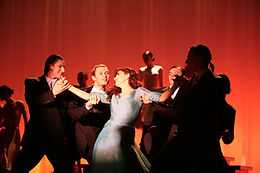
Jean-Marie Riachi also arranged “Nashid Al Zifaf” written by Noha Najem, with a new Arabic adaptaion of the Wedding March in C major for German pianist, composer, organist and conductor Felix Mendelssohn, originally used among the most well-known pieces and suites to Shakespeare’s play ‘’A Midsummer Night’s Dream’’. The track, dedicated to every girl getting married with, is full with sincere, truthful and warm wishes of eternal happiness. The arrangement shows a nice mixture of drums and strings and many symphonic instruments within the introduction along with mature choir. The piece extends for more than two octaves; from the low G3 with a semi-note transition in the last part of it where Majida hits a high C#6.[15] Dr. Abdel Rab Idriss also composed music for another track titled "Laylika Al Sari" (Your Ongoing Night) from Al Nasser’s poetry and Assaad Khoury adapted a new version of "Ya Maazeb Albi" in Egyptian Arabic dialect, previously interpreted by Halim El Roumi from his composition.
The last track is a patriotic titled "Sawfa Nabqa" (We Will Stay).[16] Joseph Khalifeh contributed Said Akl’s text into a symphonic piece to deliver a strong worded message to all Lebanese people to unity and freedom and to show how Lebanese managed to stay faithful no matter what their country faced through years. The song was arranged by Kamal Saiqali with wonderful choice of instruments and orchestration and it extended to more than two octaves and Majida hit a high A5 during a long interval of opera. Majida’s most important performance for this song was in 2005 during a concert in Beirut Downtown, in the Martyrs’ Square on 13 April, in the memory of the Lebanese Civil War beginnings:[17] Majida chose to refuse reliving the last years of war and gave the youth the choice to continue with peace or drive Lebanon to a bad future.
2011-present
Majida wrote the lyrics of "Bokra" (Tomorrow), a charity operate that was released on 11/11/2011. The single's proceeds were donated to various charitable initiatives with arts and culture programs aiming to raise funds for education projects in the Arab World.[18] In an interview with Rima Maktabi in the CNN program – Inside the Middle East, Majida told the story of the new song which was produced by Quincy Jones and RedOne.[19] In a surprising and unexpected decision, Majida announced that she has pulled herself out of the project. She said that the producer, Quincy Jones, did not meet her conditions and the team supervising and overlooking the project is not professional. Majida already put her voice on the operate, but when they asked her to record again in Qatar, she announced her withdrawal and waived her authorship rights when she backed out of the project.[20][21]
"Ghazal"
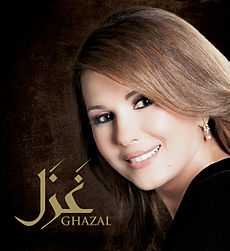
Majida released her new album "Ghazal" on June 22, 2012 having worked on it for 6 years with many composers and poets.[22] The album includes 14 songs, and for the first time, Majida wrote 8 of them. The album is characterized by a musical mix between western and oriental music.
After the huge success of "E'tazalt Al Gharam" in 2006, Majida cooperated again with Lebanese poet Nizar Francis and the composer Melhim Barakat giving her another masterpiece "W Btetghayyar Al Da'aye'" (And Minutes Change) with a long orchestral intro. The song is about a lady, madly in love and her compassion towards her beloved will never change until she dies.
For the second time, after the phenomenal success of "Tawq Al Yasameen", Majida worked with Iraqi composer Kadim Al Sahir who composed "Wa'adtouka" (I Promised You) written by the modern Syrian poet Nizar Qabbani. The poem is about a woman who keeps promising her lover that she will stop loving him, but eventually, she realizes she cannot resist him.
"Bass Ellak Habibi" (When I Tell You I Love You) is an Arabic adaptation of "Eternally", originally a song with music by Charles Chaplin and words by Geoff Parsons. It was initially composed for Charles Chaplin's film Limelight in 1952. The Arabic lyrics were written by Majida herself and the musical arrangement was accomplished by Jean-Marie Riachi.
Track number 4 is "Metghayyar W Mhayyarni" (Changed And Confusing Me) is a rhythmic Jazz song in which Majida reveals a new kind of music style compared to her previous songs. This song is also written by Majida and composed by Saudi Arabian Abd El Rabb Idriss who has previously created an oriental melody based on oud but Jean-Marie Riachi adapted it in a modern jazzy version based on drums and saxophones.
In this album, Majida made another international step ; after Habibi's adaptation in 2006 of Adagio by Tomaso Albinoni previously sang by Lara Fabian, by singing "Al 'Alam Elna" (The World Is Ours) : she put lyrics to the Suite for Jazz Orchestra No. 2 (Waltz No. 2) composed by Soviet Russian composer and pianist Dmitri Shostakovich in 1938. In this song, Majida hits the lowest note in this album which is F#3.
"E'Balni Hayk" (Accept Me The Way I Am) is the 6th track, also written by Majida and composed by Jean-Marie Riachi. The melody starts calmly and becomes gradually strong and intense.
"Al tayru Taraban Yugharridu" (The Bird Is Enchantingly Tweeting) is a classical Arabic poem written by His Highness Dr. Sultan bin Mohamed Al-Qasimi and composed by Claude Chalhoub, who has accomplished a magnificent oriental violin solo, and Léna Khater. In this difficult song, Majida proves her pure Tarab (oriental) skills mixed with a western spirit.
"Salawna" (We Forgot And Moved On) was originally sang by Majida's father, and was also included in a previous album (Dawi Ya Amar – 1986) and now Majida has released a new version of it as a duet with her father. This song was dedicated to her father's soul.
"La Ma Te'elly Habbayta" (Don't Tell Me You Fell For Her) is a typical oriental Pop song written by Majida herself and composed by Jean-Marie Riachi.
"A'la Albi malak" (My Heart's King) starts with a magical piano solo. It is also written by Majida and composed by Tarek Abou Jaoudeh. It takes majida to a rhythmic side with modern instruments such as accordion. Previously, Majida sang it in several concerts like Biel (2009), Carthage Music Festival (2010), Mawazine Festivals (2010), Jounieh International Festival (2011).
"La Ma Rah Eza'l A'chi" (No, I Won't Regret Anything) is written by Majida too, and composed by Marwan Khoury. This song has known a huge success from Lebanese and Arabic audience as well. Firstly, Majida sang it in 2008 during Beiteddine Festival. In this song, Majida expresses a "scream" of freedom and a rebirth of a more powerful women who surpasses life's difficulties and rises after a lot of sacrifices have been given.
"Law Ta'ref" (If You Knew) is a romantic song written by Majida and composed by Tarek Abou Jaoudeh. It shows her suffering towards her beloved who was not loyal to their love and had no respect to her feelings.
"Biladi Ana" (My Country) is a duet between Majida and Senegalese singer Youssou N'Dour. Arabic lyrics are taken from Cadmus, Said Akl's theater play and French lyrics are freely inspired from the same theater play by Lebanese novelist Alexandre Najjar. Musical composition is accomplished by Joseph Khalifeh and Jean-Marie Riachi. This song describes Lebanon "the peace", "the beauty", "the creativity" and encourages fraternity, unity between people worldwide and calls for loving each other by surpassing all human differences. Majida and Youssou N'Dour have already performed it during the VIe annual Jeux de la Francophonie in 2009,[23][24] hosted in Camille Chamoun Sports City Stadium in Beirut accompanied with more than 150 dancers. In this song, Majida hits the highest note in the album which is the E5.
"Nashid Al Chohada'" (Martyr's Hymn) is a patriotic song written and composed by Elie Choueiry, encouraging people, specially Lebanese, to forget wars and move on peacefully without getting blindly involved into politics.
Majida chose to deliver to everyone who helped and worked on "Ghazal" a nice message at the end of the album booklet by writing: "I would like to thank all my team and all those who had faith in me, to reach such a great dream called Ghazal - Magida El Roumi"
"Ghazal" was produced under the label of V. Production, Jean-Marie Riachi is its executive producer and all songs were recorded and mixed at JMR studio's by Xavier Escabasse. Rhythmic and brass section were recorded at studios Val d'Orge and Meudon assisted by the Budapest Symphony Orchestra recorded at studio Tomtom and Radio Budapest with vocals and oriental instruments recorded at JMR studio's. All tracks were mastered at Color Sound in Paris, France. The professional photographer Maya Kanakry took care of Majida's photo-shoot sessions.
"Nour Men Nour"
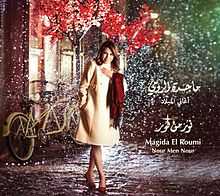
Nour Men Nour (A Light From Light) is the fourteenth studio album by Majida released on December 2013 produced by V.Productions.[25] The album explores 12 Christmas carols exploring a wide set of musical genres including classical music and Opera preserving the same musical track that Majida had sang over the years.
The Album peaked the top of the music charts in Virgin Megastores in Lebanon from the day of its release for several consecutive weeks.[26][27][28] Critics also gave largely positive reviews, favoring its shift between modern and global sounds, and its ability to join these sounds with local music and Arabian themes. Lyrically, the record speaks of love, forgiveness, family and the relationship between God and men.
Nour Men Nour was promoted majorly online and on Lebanese radio stations by two singles, Sahrit Eid and Min lli Tall, as well as a teaser on Majida's official Facebook page. Majida also filmed a Christmas special episode aired on Christmas Eve on MTV Lebanon which included a live recital from Collège du Sacré-Cœur catholic cathedral in Gemayzeh, Downtown Beirut, and scenes from a visit she had to "Mission De Vie" charity center. As Majida stated, Christmas is an occasion to celebrate as a one big Arabic family, while she added that all sales income and profits went to charity to encourage the spirit of sharing in the Arab World during the unstable periods.[29] Lebanese violinist and music arranger Claude Chalhoub arranged all 12 tracks. He is also the music producer for this record and worked with the Berlin Symphony Orchestra (BSO).
Starting with its wide arrangement, Nour Men Nour holds some of the most famous international tunes and jingles with new adapted styles, like the Waltz for "Sahrit Eid" originally We Three Kings composed by John Henry Hopkins, and "De'e Bwabon" originally adapted from Hark! The Herald Angels Sing by Felix Mendelssohn. Henry Zoughaib worte "Min Lli Tall", too. Its large string sections and Harp noted a remarkable adaptation of Adolphe Adam's O Holy Night transposed to a classical mood carol by Majida's operatic abilities. For a short Christmas jingle, Joseph Khalifeh composed "Nour El Alam", a classical wide-ranged song with high pitches and large orchestration. Claude Chalhoub re-adapted the old version of "Nachid El Hobb" composed by Joseph Khalifeh previously released by Majida as a single in 2001.
Performances
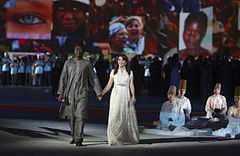
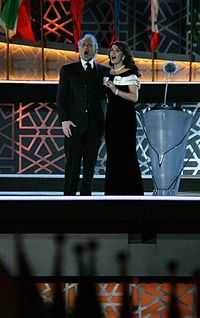
Majida has performed during several festivals mostly in Beiteddine Festivals- Lebanon, Jerash- Jordan, Rabat- Morocco, Bosra- Syria, Carthage- Tunisia, Al Ain, the largest city in the Emirate of Abu Dhabi lately during the Classical Music Festival in 2010 accompanied with the Russian Orchestra conducted by Andre Galanov. Majida also appeared at the Cairo Opera House many times, and sang in Doha- Qatar, Dubai- UAE in addition to The Roman theater of Marina, Alexandria and many other concerts and performances in the Arab World.
Majida stood twice on the Paris Olympia stage: first time in 1993[30] and second time in 1998 sponsored by Lebanese First Lady at that time Mrs. Mona Herawi, Palais des Congrès de Paris in 1987,[31] the opening of Damascus Opera House in 2004, Athens Concert Hall in Greece[32] and the Royal Albert Hall in London which knew a huge success and was the first sold out concert after The Beatles' concert in 1965.[33] Also, later in the 90s, Majida welcomed Shirley Bassey in the presidential palace in Lebanon for a private concert, she opened in one song before giving Shirley the stage whose orchestra members stood up, astonished by Majida's spectacular soprano performance.[34]
Majida has also performed at Avery Fisher Hall in Lincoln Center, Carnegie Hall and Hunter College in New York City as well as the Place des Arts in Montreal, Canada in November 2003[35] attended by more than 3000 people with incredible standing ovations,[36] then headed to Côte d'Ivoire in 2003 for two concerts which proceeds were returned as benefits to civil war orphans. The concert was attended by the country's president and First Lady. In 2007, Majida toured the USA and performed in Fox Theatre (Detroit, Michigan) and the tour included nights in Paris Hotel in Las Vegas.
Majida was also part of the annual Mawazine Festival in Morocco in June 2010,[37] and Jounieh International Festivals on 25 June 2011.[38] She also held a concert in Royal Opera House of Muscat in Shati Al-Qurm district in Oman in November 2011.[39]
In December 2006, Majida performed "Light The Way", a duet with the international opera star, the tenor José Carreras at the 2006 Asian Games opening ceremony in its 15th edition in Doha.[40][41] In 2009, she performed "Nous sommes les amis du monde", a duet with Senegal artist Youssou N'dour, on the inauguration of the "Jeux Olympiques de la Francophonie" in Beirut, Lebanon.[42]
Majida had a special TV appearance in Christmas time during a recital hosted in the Lebanese Presidential Palace. President Michel Sulaiman and First Lady Wafaa hosted many public figures, politicians and artists in this occasion. The recital was broadcast live on the Lebanese Broadcasting Corporation.[43]
Majida El Roumi's concerts included a tour in the Arab world in 2012–2013; she was part of the Batroun International Festival 2012 [44] and hosted a concert in the touristic neighborhood of Katara, Qatar on its Amphitheatre.[45] The summer of 2013 was very active with Majida's sold out concerts. After her concert is Megarama Centre in Casablanca, Morocco, she was part of the 49th edition of Carthage Music Festival; she worked for the first time with the Tunisian Symphony Orchestra. It was a one of a kind concert for her in Carthage[46] and M. Mourad Saqli, president of the festival confirmed that Majida's night ranks first in terms of income among the whole performances.[47] She also visited Chokri Belaid's shrine to pray for this person who gave for his country so much, and "Ben Saadoun" children hospital checking up how could their hard cases be treated and taken care of, after hosting a press conference explaining how exceptional this visit is.[48][49] Following her continuous success, concerts in Morocco were more demanded that she was part of the 9th edition of Twiza Festival in Tangier.[50] and Timitar Music Testival in Agadir in its 10th year.[51][52][53] Her visit to Tanger also included a visit to the children's orphan hospital in "Al Qortobi" center and give the kids some presents.[54] Majida opened the Bahrain Summer Festival in August 2013, too; a full house concert with a wonderful performance with songs for love and peace on the Bahrain National Theater.[55][56]
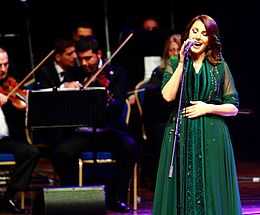
The Batroun International Festivals in Lebanon won Majida over one more time for another performance for the end of August in 2013. The country's political situation was unstable as her concert followed two consecutive explosions in Beirut suburbs. People attended the sold out concert leaving with moments filled with Majida's voice. It was also the only concert ever that Majida sang "Kalimat" twice with historical standing ovations between each and every song of the program.[57][58] Majida's first concert in 2014 and after 40 years of her career debut was for the closing season of Dubai Classics in February, it was held in Dubai World Trade Center.[59][60] The festival opening was with international artist Sarah Brightman performing her Dreamchaser World Tour.[61] Majida broke her 8 years of absence and went back to Egypt for a concert in March on the stage of Bibliotheca Alexandrina in Alexandria. Although Majida’s Alexandria concert tickets were criticised for being overpriced, the event sold-out and was (as expected) a raging success.[62] She opened her concert by a mix of both the Egyptian and Lebanese national anthem then sang most of her oldies and hits . In her press conference a day before the concert, Majida affirmed that the aim of this visit was just to encourage the tourism in Egypt after the crises the country has been through. She also pointed out she has nothing but respect for the June 2013 Egyptian protests emphasizing that she has no political intentions whatsoever.[63] At the end of the concert, the mayor of Alexandria, Mr. Tarek Mahdi gave majida the golden key of the city in the presence of the minister of tourism in Egypt Mr. Hicham Zaazouh.[64] A day after her concert, Majida spent a touristic tour in the city and visitied Montaza Palace where she planted in its garden the first Lebanese Cedar since King Farouk's era,[65][66] she also cried over Youssef Chahine's tomb as a loyal memory for the maker of her first movie.[67][68]
Public positions
"Music can speak out louder than words. I will use my music and my voice to speak out on behalf of the needy and undernourished everywhere."—Majida El Roumi
"I liked her thoughts and clarity of mind before loving her velvety voice, Majida EL Roumi, resembles me in depth as a rebel. She’s very promising; she feels and intelligently understands the word which is a rare quality. I believe Lebanon is in great need of her, and she will become Lebanon’s Ambassadress to all Lebanese and Arabs alike."—Arabic poet Nizar Qabbani
Majida El Roumi was appointed an ambassador for the United Nations' Food and Agriculture Organization (FAO) on World Food Day, October 16, 2001 in an official ceremony in Rome, Italy.[69] She has participated in numerous round-table discussions on the role of FAO ambassadors in helping the Organization combat world hunger. As FAO ambassador, Majida inaugurated the First Annual Agricultural Week in Lebanon and dedicated the book prepared by FAO Sanabel El Kheir on November 8, 2005 during an official ceremony to celebrate World Food Day 60th Anniversary at the UNESCO Palace in Beirut. Majida El Roumi made her debut appearance as the new Patron of the Lebanese Osteoporosis Prevention Society and of the Bone & Joint Decade (Lebanon) at a large press conference at Beirut’s Phoenicia Hotel on the 31 October, following a week-long campaign of television interviews by various members of LOPS committee on the occasion of World Osteoporosis Day.
In her acceptance speech, Majida said: "While pursuing our dreams and hopes, we tend to forget the importance of our bones, and we end up wearing them out - we realize only when it is too late that we didn’t take care of them. This is why I am participating in this campaign, to shed light on this truth, because if we are aware we can avoid this terrible disease and thereby avoid misery, sadness and a poor quality of life."[70]
She was also chosen as an ambassador of the 'Alam Sagheer' (Small World) program, along with Titanic actor and producer Billy Zane, dedicated to education without borders. Majida said during a press conference that the event is evidence that humanity can unite for good and to make peoples lives better anywhere in the world. She also thanked the organizers and hoped peace will spread all over the Arab world.[71] The charity event was held under the patronage of H.H. Sheikh Nahyan bin Mubarak Al Nahyan, who described the festival as one that “celebrates human connections, international dialogue and strong support for the less fortunate of our fellow global citizens - values that are fundamental to our collective vision for the United Arab Emirates”. The festival took place at Emirates Palace and expected to raise millions for underprivileged children across the globe. The Minister toured with Majida various booths of participating countries and they attended performances for each country including Lebanon.[72]
In December 2012, Majida El Roumi visited the United Nations Economic and Social Commission for Western Asia (ESCWA) headquarters to follow up on the exacerbating problem of poverty in Beirut. El Roumi called for educating the youth since, “ignorance can only lead to poverty,” as per her words. "Poverty is the cradle of wars, violence and corruption”, she said, expressing hope that women would come to realize their true capacities and their equal worth to men. She also considered that art is a message that should be used for common good hoping that her message will prompt officials to tend to Lebanon’s disadvantaged members of society.[73]
In celebration of Bulgari's 130th anniversary,[74] Majida El Roumi has been named the first Middle East Humanitarian Ambassador of the Bulgari – Save the Children Partnership in July 2014 and joins the likes of Naomi Watts, Dita Von Teese, Meg Ryan, and Leighton Meester and so many others in the support of this worthy cause. The partnership between one of the industry’s leading jewelry houses and the world’s largest independent international organization running programs in developing and developed countries has generated over AED 98 million and benefited under-privileged children in 23 countries around the globe.[75] El Roumi is responsible for the overall direction, leadership, and coordination of Save the Children programs in Jordan[76] as it was told in the press conference that took place at Al Bustan Hotel- Lebanon, in the presence of a crowd of Lebanese journalists and dignitaries. The renowned Spanish photographer Fabrizio Ferri has actively supported this initiative with his time and talent. Over the years, he has photographed over 200 celebrities wearing the ring and the pendant in support of Bvlgari’s commitment to quality schooling for the world’s neediest children[77] including Majida, whose poster was officially launched during the press conference.[78] Majida clearly stated during the press conference "I will strive to bring joy to my surroundings and to the people who are in need of it. Everything that's happening is a crime in every meaning of the word. I feel that I have a mission and my appointment is for a cause that I truly believe in. I will travel the extra mile and do what I can regardless of the size of my mission."[79] She also added, “There is no financial rewards for my participation in this humanitarian effort, as financial things do not bring happiness.”[80]
Voice characteristics
Majida’s first singing coach was her father, who followed her talent from her childhood and trained her on oriental singing and improving her vocals. Later she was influenced by many artists such as Fairuz, Umm Kulthum, Leila Mourad and Asmahan.
"I’m proud to be Lebanese, since my citizenship corresponds to such a marvelous, clear, irresistible voice like that of Majida EL Roumi; who rarely has any resemble, her talent equals her modesty, and her beauty equals her spontaneousness."—Pianist Walid Akl[81]
 |
"Al Hobb Wal Wafaa"
Sample From Al Hobb Wal Wafaa (2006) for Majida El Roumi with an oriental pitch in a hard melismas interval. |
| Problems playing this file? See media help. | |
She is known for her wide vocal range. It includes the Soprano range as it extends from the low E3 to the high C#6, meaning 2.9 octaves. Majida also sang the Lyric soprano style in “Cithare Du Ciel” album in 2003: she focused on opera techniques with ease in vibrato and high notes (As one can hear in her French version of "Miserere mei, Deus" (Have Mercy On Me, O God) where she hits a high G#5).
Majida’s voice is powerful, also agile, she usually sang with chest register but most of her songs include operatic parts where she shows real abilities in head voice. She is also from the rare artists who ever excelled in singing both western and oriental songs (Tarab) as well as the classical techniques.
Speeches
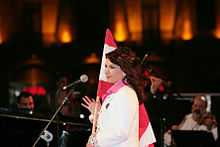
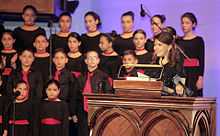
During many cultural, social and political events, Majida El Roumi always chooses to deliver messages or was asked to give a speech for the occasion. Some of her marked speeches are listed below:[82]
- Ghazal's First Copy: In a passionate speech addressed to Lebanese, El-Roumi entreated her compatriots to join her in her mission of peace, rejecting wars and divisions in a special release ceremony for her album Ghazal. Majida chose to donate proceeds from her new album to student scholarships at AUB in 2012.[83][84]
- Bikaffe (It Is Enough): A strong speech at the memory of the well-known Journalist Gebran Tueni after 2 years from his assassination. This speech is dedicated to all Lebanese people, leaders and especially politicians in 2007.[85]
- Dialogue Between Generations: A speech Majida delivered in Jerash- Jordan about dialogue between generations in 2002.
- Maha: A poem written by Majida mourning her sister Maha, during a special mass in Kfarshima in 2002.
- Water: An article for Majida published in Lebanese newspapers on the International Water Day in 2002.
- World's Peace: Majida's speech on the International Day of Peace in Beirut in 2002.
- Telefood Day: An article for Majida published in Lebanese newspapers on the World Food Day in 2002.
- FAO Ambassadress: Majida's speech for her designation as the honorable ambassadress of the Food and Agriculture Organization (FAO) in 2001.
- Nizar Qabbani: A short message by Majida mourning the Arab poet Nizar Qabbani in 1998.
- Red Cross: Majida's speech about Red Cross at a concert in Tripoli, Lebanon in 1996.
- Rapture: Majida's opinion on ecstasy while singing in 1995.
- Cedar's Medal: Majida's speech on the occasion of receiving Lebanese Medal of the Cedars from President Hraoui in 1994.
- The Lebanese Song: A lecture Majida gave on the Lebanese song and music in 1992.
- Halim El Roumi: Majida's speech on the occasion of commemorating her father, Halim El Roumi, in Kfarshima- Lebanon in 1991.
Discography
Albums
| Release Year | Album | Label |
|---|---|---|
| 1977 | Wadaa (The Farewell) | Voix d'Orient (Sawt Al Sharq) |
| 1982 | Live Recordings | Voix d'Orient (Sawt Al Sharq) |
| 1983 | Majida El Roumi Wal Atfal (Majida And The Kids) | Relax-In by Ahmad and Mahmoud Moussa & CO |
| 1986 | Dawi Ya Amar (Moon So Bright) | Yousuf Haider CO. Kuwait |
| 1988 | Ya Saken Afkari (O Resident Of My Thoughts) | Relax-In by Ahmad and Mahmoud Moussa & CO |
| 1991 | Kalimat (Words) | Arabian Masters |
| 1994 | Ebhath Anni (Look For Me) | Music Master |
| 1996 | Rasael (Letters) | Rotana Records |
| 1998 | Ouhebouka Wa Baad (I Love You And More) | Farasan Productions[86] |
| 2003 | Irhamni Ya Allah (Have Mercy On Me My God) | All Rights Reserved for Basilica of Our Lady of the Miraculous Icon - Ashrafiyeh |
| 2003 | Cithare Du Ciel (The Sky's Cithare) | All Rights Reserved for Basilica of Our Lady of the Miraculous Icon - Ashrafiyeh |
| 2006 | E'tazalet El Gharam (I Quit Love) | Good News 4 Music |
| 2012 | Ghazal (Flirtation) | V. Productions |
| 2013 | Nour Men Nour (The Light Of Light) | V. Productions |
Singles
Since the 1970s, Majida always released singles, with some of them were not included in her albums. She also performed many Christmas carols in several recitals, and dedicated patriotic singles for countries she visited. Most well-known singles are listed below:
| Song Title | Poet | Composer | Notes |
|---|---|---|---|
| Adam Wa Hanan | Jamal Bkhit | Farouk Al Sharnouby | The soundtrack for Egyptian movie "Al-Akhar" (1998). |
| Ahenou Ilayka | Al Nasser | Abdel Rab Idriss | Performed many times on stage including in Carthage International Festivals in 2003 and in Dubai in 2004 |
| Ahla W Sahla | Majida El Roumi | Marwan Khoury | (to encourage tourism in Lebanon) Sang for the first time at the Batroun International Festival 2012 and will be released in 2013. |
| Al Bahrain | Jamal Bkhit | Michel Jeha | Dedicated to Bahrain. |
| Al Qassam | Ali Al Sharqawi | Ihsan EL Monzer | Last performed in 2005, during the concert in Martyrs' Square, Beirut. |
| Nashid Al Salam (AL Zanabeq Al Baydaa) | Mahmoud Darwish | Joseph Khalifeh | First performed in a concert in Beirut Downtown in 2008 also in a concert in Egypt in the same year. |
| Ala Anhad | Abou El Kassem El Chabbi | Halim El Roumi | |
| Ana Habbaytak Ana | Eliya Abou Chedid | Nour El Mallah | Sang in 1986 at LBC TV program. |
| Assalama | Elie Choueiry | Elie Choueiry | Dedicated to Tunisia, last performed in 2010 during Carthage International Festivals. |
| Bakeer Fallayt | Majida El Roumi | Joseph Khalifeh | Dedicated to Halim El Roumi, performed in 1988 during a concert in Casino Du Liban. |
| Bel Majdi Wal Karama | Prayer | Example | Prayer released in a special album for Majida's daughter, Hala, distributed during the wedding ceremony in 2006. |
| Byawm Ersik | Talal Haydar & Majida El Roumi | Salim Assaf | Special wedding song for Majida's daughter Hala during her wedding, released in a special album and distributed during the wedding ceremony in 2006. |
| Domina | Dr. Souad Al Sabbah | Elias Al Rahbani | Dedicated for Kuwait. |
| El Madaen | Habib Younes | Elie Choueiry | Dedicated to Jordan. |
| Emmi | Eliya Abou Chedid | Elie Choueiry | Performed in 1988 during a concert in Casino Du Liban. |
| Ftahi Albik | Majida El Roumi | Richard Rodgers | With music from The Sound of Music musical in 1959, also a special wedding song for Majida's daughter Hala during her wedding, released in a special album and distributed during the wedding ceremony in 2006.[87] |
| Ghadabak Nar (Al Thawra) | Elie Choueiry | Elie Choueiry | Patriotic (Performed in 1988 during a concert in Casino Du Liban) |
| Hal Tasma'in | Majida El Roumi | Elie Choueiry | Dedicated to Palestine. |
| Hasnaa Carthage | Farouk Joueidy | Halim El Roumi | Majida sang a new version after Halim El Roumi previously performed it. |
| Jayi Men Beirut | Abdel Rahman El Abnoudi | Jamal Salameh | Patriotic |
| Kiriyalaysoun | Prayer | Ziad Rahbani | Prayer (1976) |
| Kouwait Ya Bilad El Salam | Joseph Khalifeh | Dedicated for Kuwait. | |
| Lebnan | Majida El Roumi | Jean-Marie Riachi | Majida performed it once in Jounieh International Festials in 2011 dedicated to Lebanon. |
| Lebnanikon Lebnanina | Elie Choueiry | Elie Choueiry | Patriotic dedicated to Lebanon performed many times in 2007 and 2008. |
| Lebsou El Kafafi | Talal Haidar | Nour El Mallah | Performed in Casino du Liban concert in 1988. |
| Ma Ajmal Al Oshaq | Al Nasser | Jamal Salameh | Performed many times on stage, including in the Olympia concert in 1998. |
| Ma Baddi Hadaya | Majida El Roumi | Joseph Khalifeh | A Christmas Carol released in 2005. |
| Marrou Bina Nashar | Habib Younes | Ihsan El Monzer | |
| Mouftaraq El Toroq | Salah Jahin | Kamal Al Tawil | Majida worked for the first time with composeer Jamal Salameh in 1976 in the song's arrangement. The song was in Egyptian Arabic dialect and Majida sang it in the movie "Awdat Al Ibn El Dall" (The Return of the Prodigal Son). |
| Nashid Al Hobb | Gibran Khalil Gibran | Joseph Khalifeh | Released in 2001 |
| Tkhayaltak Jayi Men Biid | Eliya Abou Chedid | Ihsan El Monzer | Released in 1988 |
| Tofli Zghiri | Majida El Roumi | Abdo El Monzer | Released in 1994 |
| Touba Lel Sa'eena | Prayer | Ziad Rahbani | 1976 - Last performed in the meeting with the youth during Pope Benedict XVI's visit to Lebanon in September 2012.[88] |
| W'sina | Henry Zgheib | Jamal Salameh | 1996 |
| Wajaba El Shokrou | Ibn Zurmruk | Halim El Roumi | A Muwashshah performed by Majida in the 80s. |
| Woulida El Massih | Prayer | Joseph Khalifeh | A Christmas carol recorded and released in 2005. |
| Ya Kouwait | Henri Zougheib | Elias Al Rahbani | Dedicated to Kuwait. |
| Ya Qatar | Elie Choueiry | Elie Choueiry | Dedicated to Qatar, the song was performed in Doha concert in 2006. |
| Ya Taleb Iddy | Said Akl | Zaki Nassif | Patriotic dedicated to the Lebanese Army released in the 80s and Majida last sang this song in Jounieh International Festivals in 2011. |
| Yarnou Bi Tarfen | Eben Jaber El Darir | Halim El Roumi | A Muwashshah performed by Majida in the 80s. |
Egyptian songs: remakes
| Song Title | Poet | Composer | Notes |
|---|---|---|---|
| Ya Touyour | Youssef Badrous | Mohammed al-Qasabji | Originally sang by Asmahan |
| Layali El Onsi Fi Vienna | Ahmed Rami | Farid al-Atrash | Originally sang by Asmahan |
| Ehna El Tnen | Hassan Al Sayyed | Riad AL Sunbati | Originally sang by Leila Mourad |
| La Mosh Ana Lli Abki | Houssein Al Sayyed | Mohammed Abdel Wahab | Sang by Mohammed Abdel Wahab |
| Ha Laweaak | |||
| Emta Ha Taaraf | Ma’moun Al Chinawi | Mohammed al-Qasabji | Originally sang by Asmahan |
| Ana Albi Dalili | Abou Saoud Al Abyari | Mohammed al-Qasabji | Originally sang by Leila Mourad and last performed by Majida during a concert in the American University of Beirut in 2009.[89] |
Videography
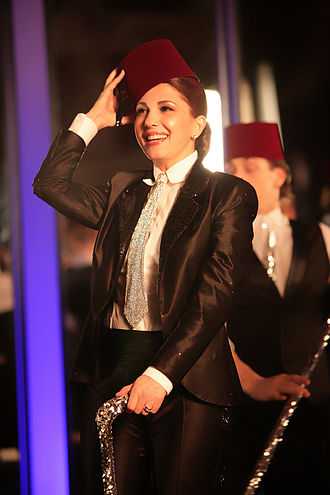
| Release Year | Song Title | Notes |
|---|---|---|
| 1975 | Am Behlamak Ya Helm Ya Lebnan | |
| 1975 | Kell Shi Am Yekhlas | |
| 1977 | Am Yes'alouni Alayk El Nass | |
| 1977 | Wadaa | |
| 1978 | Khedni Habibi | |
| 1988 | Ana Am Behlam | |
| 1988 | Min Elna Ghayrak | |
| 1989 | Al Madaen | |
| 1990 | Domina | |
| 1991 | Kalimat | |
| 1991 | Kouwait Ya Bilad Al Salam | |
| 1994 | Al Jarida | Directed by Sten Walegren. |
| 1994 | Kon Sadiqi | Directed by Sten Walegren. |
| 1994 | Lan Aoud | |
| 1996 | Aynaka | Directed by Ralph Dfouni. |
| 1996 | Hobbouka (Vol.1) | Directed by Corine Chedrawi. |
| 1996 | Hobbouka (Vol.2) | Another Clip release for this song directed by Ralph Dfouni. |
| 1996 | Qana | Directed by Georges Ghayad. |
| 1998 | Sayedi El Rais | Directed by Ralph Dfouni. |
| 1999 | Adam Wa Hanan | Directed by Khaled Youssef, from Al-Akhar, movie by Youssef Chahine. |
| 2000 | Beirut, Set Al Doniya | |
| 2001 | Nashid El Hobb | |
| 2005 | Al Hobb Wal Wafaa | Directed by Said Al Marouk. |
| 2006 | E'tazalet El Gharam | Directed by Nadine Labaky. |
| 2006 | Habibi | Tribute to Ahmed Zaki taken from a concert in Egypt in 2006. |
| 2008 | La Ma Rah Ez'al A Shi | Directed by Toni Kahwaji, taken from Beit El Dine Festivals 2008. |
Honors and Titles
 Tunisia: National Order of the work from the Presidency of the Republic of Tunisia in 1987.
Tunisia: National Order of the work from the Presidency of the Republic of Tunisia in 1987. Lebanon: The Golden Cedar, 1988.
Lebanon: The Golden Cedar, 1988. France: Shield from the French National Assembly for 1993.
France: Shield from the French National Assembly for 1993. Lebanon: National Shield of Honor of the Cedars, Knight's Order from the President of the Lebanese Republic, 1994.
Lebanon: National Shield of Honor of the Cedars, Knight's Order from the President of the Lebanese Republic, 1994. Algeria: "Algerian citizenship" Certificate from the People's Democratic Republic of Algeria, 1997.
Algeria: "Algerian citizenship" Certificate from the People's Democratic Republic of Algeria, 1997. France: The Médecins Sans Frontières Shield in 1999.
France: The Médecins Sans Frontières Shield in 1999. Egypt: Order of Merit from the Egyptian Journalists Syndicate, 2000.
Egypt: Order of Merit from the Egyptian Journalists Syndicate, 2000.- A Certificate and a shield of Honor for FAO Ambassador, 2001.
 Jordan: Honoring Shield from her Majesty Queen Noor of Jordan in 2002.
Jordan: Honoring Shield from her Majesty Queen Noor of Jordan in 2002.  Ivory Coast: The National Shield of Honor, Order of Merit of Officer's Grade from the Republic of Côte d'Ivoire, 2003.
Ivory Coast: The National Shield of Honor, Order of Merit of Officer's Grade from the Republic of Côte d'Ivoire, 2003. Syria: The Shield of Honour from the Syrian Ministry of Culture, 2004.
Syria: The Shield of Honour from the Syrian Ministry of Culture, 2004. Algeria: Le Bouclier de l'information et de la culture / Algerian Shield of Culture and Information and The Gold Medal for the fiftieth anniversary of the outbreak of the liberation revolution, from the President of Republic of Algeria in 2005.
Algeria: Le Bouclier de l'information et de la culture / Algerian Shield of Culture and Information and The Gold Medal for the fiftieth anniversary of the outbreak of the liberation revolution, from the President of Republic of Algeria in 2005. Lebanon: Honorary member of the Students' Scholarship Association at the American University in Beirut, 2005.
Lebanon: Honorary member of the Students' Scholarship Association at the American University in Beirut, 2005. Lebanon: Honorary President of the Lebanese Association for the prevention of osteoporosis and The Universal framework of the joints and bone disease - the Lebanese branch, 2007.
Lebanon: Honorary President of the Lebanese Association for the prevention of osteoporosis and The Universal framework of the joints and bone disease - the Lebanese branch, 2007. Lebanon: Honorary Doctorate in Humanities from the Board of Trustees of the American University in Beirut, (2009).
Lebanon: Honorary Doctorate in Humanities from the Board of Trustees of the American University in Beirut, (2009). Belize: Patent of Lebanese honor and gratitude by the Universal Association of Lebanese Worldwide - Belize and the actual recognition of her efforts in the service of Lebanon, humanity and Universal peace (2009).
Belize: Patent of Lebanese honor and gratitude by the Universal Association of Lebanese Worldwide - Belize and the actual recognition of her efforts in the service of Lebanon, humanity and Universal peace (2009). Lebanon: Honoring from the Catholic Church on the occasion of an encounter of Catholic priests in Lebanon (2010).
Lebanon: Honoring from the Catholic Church on the occasion of an encounter of Catholic priests in Lebanon (2010).
 Morocco: The National Shield of Honour.
Morocco: The National Shield of Honour. Tunisia: The National Order of Cultural Merit from the Rubplic of Tunisia, 2010.[90]
Tunisia: The National Order of Cultural Merit from the Rubplic of Tunisia, 2010.[90] Lebanon: The National Shield of Honor of the Cedars - Order of Commodore from the President of the Republic, June 25, 2011.
Lebanon: The National Shield of Honor of the Cedars - Order of Commodore from the President of the Republic, June 25, 2011. France: Ordre des Arts et des Lettres - insigne d'Officier / Officer Grade, from the president of the Republic, January 24, 2013.[91]
France: Ordre des Arts et des Lettres - insigne d'Officier / Officer Grade, from the president of the Republic, January 24, 2013.[91] Egypt: The Golden Key of the city of Alexandria from the mayor Mr. Tarek Mahdi, March 20, 2014.[92]
Egypt: The Golden Key of the city of Alexandria from the mayor Mr. Tarek Mahdi, March 20, 2014.[92]
Gallery
-

Portrait by Maya Kanakry for Majida taken in 1991.
-

Majida El Roumi during her music video shoot in 2006.
-

Majida El Roumi during the making of "E'tazalet El Gharam" music video in 2006.
-

Majida El Roumi honored by P. Michel Suleiman during her concert in Jounieh in June 2011.
References
- ↑ http://www.ghadinews.net/ar/Newsdet.aspx?id=331&id2=22
- ↑ Video on YouTube
- ↑ http://www.nna-leb.gov.lb/en/show-report/90/Kfarshima-Birthplace-of-many-great-Lebanese-singers-musicians-and-composers
- ↑ http://www.yasour.org/archive/haleemelroumy.html
- ↑ Video on YouTube
- ↑ http://www.fairouzehfriends.com/t4018-topic
- ↑ http://www.jabalnamagazine.com/music_details.php?id=12
- ↑ http://www.misrinternationalfilms.com/ar/%D8%B9%D9%88%D8%AF%D8%A9-%D8%A7%D9%84%D8%A7%D8%A8%D9%86-%D8%A7%D9%84%D8%B6%D8%A7%D9%84-1
- ↑ http://www.elcinema.com/work/wk1009209/
- ↑ Peter, W. "Review/Pop; Songs of a Lebanese Star", New York Times, 02 May 1989. Retrieved on 2012-10-14.
- ↑ "ملاك الطرب العربي Majdah AlRomi". Yabdoo.com. Retrieved 2014-02-03.
- ↑ "majda roumi habibi". YouTube. 2009-01-20. Retrieved 2014-02-03.
- ↑ "Habibi- Majida El Roumi (ENGLISH/ARABIC TRANSLATION". YouTube. Retrieved 2014-02-03.
- ↑ "Majda el Romi - Al Hob Wal Wafa". YouTube. 2007-04-13. Retrieved 2014-02-03.
- ↑ "ماجدة الرومي- نشيد الزفاف". YouTube. 2008-08-12. Retrieved 2014-02-03.
- ↑ "Paroles Sawfa Nabqa Majida El Roumi lyrics". Greatsong.net. Retrieved 2014-02-03.
- ↑ "10- downtown 05 ماجدة الرومي سوف نبقى". YouTube. 2012-04-04. Retrieved 2014-02-03.
- ↑ Quincy Jones releases charity single Bokra in Dubai | GulfNews.com
- ↑ Entertainment | Charity Song
- ↑ Majida El Roumi Pulls Out of the "Bokra" Operate
- ↑ "ماجدة الرومي تنسحب من أوبريت ''بكرا'' مع كوينسي جونز". Elkhabar.com. Retrieved 2014-02-03.
- ↑ "بالصور والصوت- (غزل) ماجدة الرومي في الأسواق... واول معجب يحصل على الألبوم". Bisara7a.com. Retrieved 2014-02-03.
- ↑ La sublime Majida el Roumi et l'excellent Youssou N'Dour, stars de l'ouverture des Jeux de la Francophonie
- ↑ RFI - Ouverture des VIe Jeux de la Francophonie à Beyrouth
- ↑ ماجدة الرومي تطلق نور من نور بالأسواق في 5 ديسمبر المقبل
- ↑ http://www.bisara7a.com/#!ajax_readnews.php?id=20645
- ↑ السيدة ماجدة الرومي شكرت محبّيها وألبومها الأوّل يتصدّر كافة الألبومات | Bitajarod - Online Magazine
- ↑ النشرة الفنية - ماجدة الرومي "نور من نور" في الأيقونة العجائبية .. بالصور
- ↑ Majida El Roumi Shows #Christian Spirit With New #Christmas Hymn Album ~ Hot Arabic Music
- ↑ "Le Liban larmes au poing - L'EXPRESS". Lexpress.fr. Retrieved 2014-02-03.
- ↑ "Concert De Magida El-Roumi Au Palais Des Congres". Rdl.com.lb. Retrieved 2014-02-03.
- ↑ "جريدة الأنباء الكويتية | ماجدة الرومي تغني في اليونان". Alanba.com.kw. Retrieved 2014-02-03.
- ↑ "??". Fbcdn-sphotos-h-a.akamaihd.net. Retrieved 2014-02-03.
- ↑ "Tune East - Majida El Roumi". YouTube. 2013-09-06. Retrieved 2014-02-03.
- ↑ "ماجدة الرومي في جولة غنائية من كندا إلى ساحل العاج". Aawsat.com. 2003-10-18. Retrieved 2014-02-03.
- ↑ "ماجدة الرومي في 2003". Elaph.com. 2003-12-31. Retrieved 2014-02-03.
- ↑ "Majida El Roumi to open Moroccan Mawazine Festival". Al-Shorfa. Retrieved 2014-02-03.
- ↑ "Majida al-Roumi ignites Jounieh with an evening of patriotic songs | Culture , Performance". The Daily Star. 2011-06-27. Retrieved 2014-02-03.
- ↑ "Magida El Roumi, the Lebanese diva who has been enchanting the Arab world since the 1970's, will make her Royal". Omaninfo.com. Retrieved 2014-02-03.
- ↑ "DAGOC Announces Stars for Doha 2006 Opening Ceremony | Arab News — Saudi Arabia News, Middle East News, Opinion, Economy and more". Arabnews.com. 2006-11-18. Retrieved 2014-02-03.
- ↑ Dunworth, James (2006-11-29). "Doha Games Opening Ceremony | Qatar Visitor - Travel Guide to Doha & Qatar". Qatarvisitor.blogspot.com. Retrieved 2014-02-03.
- ↑ "La soprano libanaise Magida El-Roumi lors de la cérémonie d’ouverture des VIes (...) - Organisation internationale de la Francophonie". Francophonie.org. Retrieved 2014-02-03.
- ↑ "ماجدة الرومي تحيي حفل عيد الميلاد في القصر الجمهوري — Naharnet". Naharnet.com. Retrieved 2014-02-03.
- ↑ "Majida El Roumi Concert - Batroun International Festival 2012 « Lebtivity". Lebtivity.com. 2012-08-25. Retrieved 2012-10-22.
- ↑ "حفل ماجدة الرومي في كتارا يُنقل على موقعها الإلكتروني". Kuwaityiat.net. 2013-01-19. Retrieved 2014-05-02.
- ↑ "La diva libanaise Majda Roumi a enflammé Carthage !". Tekiano.com. Retrieved 2014-02-03.
- ↑ "مداخيل حفلات قرطاج 2013 : ماجدة الرومي في الصدارة". Mosaique Fm. Retrieved 2014-02-03.
- ↑ "La Presse de Tunisie - le-destin-ne-peut-quobtemperer | 69532 | 05072013". Lapresse.tn. 2000-01-01. Retrieved 2014-02-03.
- ↑ tunivisions.net. "Vidéo". Tunivisions.net. Retrieved 2014-02-03.
- ↑ "Majda Roumi chez les Amazighs - Quid.ma I Actus & Analyses". Quid.ma. Retrieved 2014-02-03.
- ↑ "Le 10è Timitar se tiendra du 26 au 29 juin à Agadir". Lnt.ma. 2013-05-21. Retrieved 2014-02-03.
- ↑ "Majida Al Roumi Sings At Timitar Festival". Ladies Book. Retrieved 2014-02-03.
- ↑ "Music Nation » بالصور – ماجدة الرومي تتألق في الليلة الثالثة من مهرجان تيميتار في المغرب". Musicnation.me. 2013-06-30. Retrieved 2014-02-03.
- ↑ "خاص ـ صور حصرية لزيارة ماجدة الرومي لجمعية أطفال حضانة طنجة". Alaan24.com. Retrieved 2014-02-03.
- ↑ "ماجدة الرومي .. تعلن انطلاقة صيف البحرين | الوسط اون لاين - صحيفة الوسط البحرينية - مملكة البحرين". Alwasatnews.com. 2013-08-18. Retrieved 2014-02-03.
- ↑ "ماجدة الرومي للفنانين من البحرين: ضعوا أوطانكم فوق آرائكم السياسية | Al Jarida | الجريدة | Newspaper | Kuwait". Al Jarida. Retrieved 2014-02-03.
- ↑ "Events - Majida el Roumi at Batroun Festival". Beiruting. Retrieved 2014-02-03.
- ↑ "ماجدة الرومي أحيت حفلة في البترون أمام 5 آلاف شخص: صوتي مجنّد للدفاع عن حق لبنان في الحرية والاستقلال - النهار". Newspaper.annahar.com. Retrieved 2014-02-03.
- ↑ ":: Majida El Roumi In An Unforgettable Concert Closing Dubai Classics ::". Almazmix.com. Retrieved 2014-05-02.
- ↑ "Dubai Classics presents Majida El Roumi - Dubai Calendar - Dubai Events Official Listing". Dubaicalendar.ae. 2014-02-08. Retrieved 2014-05-02.
- ↑ "Dubai Classics presents Sarah Brightman - Dubai Calendar - Dubai Events Official Listing". Dubaicalendar.ae. 2014-02-07. Retrieved 2014-05-02.
- ↑ "She just can't get enough: Majida El Roumi back for a second dose of Egypt in May". Al Bawaba. Retrieved 2014-05-02.
- ↑ "حفل مهيب لماجدة الرومي في الإسكندرية". Radiosawa.com. 2014-03-21. Retrieved 2014-05-02.
- ↑ "ماجدة الرومى تشدو بـ "أنا مصرية" فى حفل كبير بالإسكندرية - الأهرام اليومي". Ahram.org.eg. 2014-03-22. Retrieved 2014-05-02.
- ↑ بالصور ماجدة الرومي تزرع شجرة أرز في حديقة المنتزة | موقع مجلة روتانا (in Arabic). Rotanamags.net. Retrieved 2014-05-02.
- ↑ "بالصور..ماجده الرومي تزرع شجرة "أرز" بحديقة قصر السلملك بحدائق المنتزة بالاسكندرية". Akhbarak.net. 2014-03-21. Retrieved 2014-05-02.
- ↑ "بالصور : ماجدة الرومي تزور قبر المخرج الراحل يوسف شاهين بالإسكندرية | صحيفة صدى الإلكترونية". Slaati.com. 2014-03-23. Retrieved 2014-05-02.
- ↑ "لأول مرة منذ أيام الملك فاروق.. ماجدة الرومي تغرس شجرة أرز لبنان بقصر المنتزه". Mobtada.com. 2014-03-22. Retrieved 2014-05-02.
- ↑ "United Nations Daily Highlights, 01-10-12". Hri.org. Retrieved 2014-02-03.
- ↑ "New Lebanese Patron, Magida El Roumi, Addresses Media for World Osteoporosis Day | International Osteoporosis Foundation". Iofbonehealth.org. Retrieved 2014-02-03.
- ↑ "Majida El Roumi Ambassador of Emirati program "Alam Sagheer"". Arabia.msn.com. Retrieved 2014-02-03.
- ↑ "Small World, big hearts". Khaleej Times. 2011-03-28. Retrieved 2014-02-03.
- ↑ "LBCI | REPORT: Singer Majida El Roumi helps the poor". Lbcgroup.tv. Retrieved 2014-02-03.
- ↑ http://www.el-balad.com/1076468
- ↑ http://www.savoirflair.com/news/6907-majida-el-roumi-announced-as-middle-eastern-humanitarian-ambassador-by-bulgari
- ↑ http://hautetime.ae/bulgari-announces-magida-el-roumi-first-humanitarian-ambassador-middle-east/48537/
- ↑ http://www.assafir.com/Windows/PrintArticle.aspx?ChannelID=85&ArticleID=364601&ref=Toolbar
- ↑ http://lebanesecelebritynews.wordpress.com/2014/08/04/majida-el-roumi-releases-save-children-in-bulgari-poster-during-press-conference/
- ↑ http://www.veooz.com/news/9HOFxis.html
- ↑ http://levant.tv/majida-el-roumi-saves-the-children-as-bvlgaris-official-ambassador/
- ↑ "Majida El Roumi". Tomorrowbokra.org. Retrieved 2014-02-03.
- ↑ "Majida El Roumi". Majidafans.com. Retrieved 2014-02-03.
- ↑ "2012 - Magida El-Roumi donates proceeds from new album to student scholarships at". AUB. Retrieved 2014-02-03.
- ↑ "Roumi sings for peace and prosperity | Culture , Performance". The Daily Star. 2012-07-06. Retrieved 2014-02-03.
- ↑ "Lady Majida El Roumi's speech-Bikaffe-Enough-(Arabic with english subtitles)". YouTube. 2008-07-07. Retrieved 2014-02-03.
- ↑ "Majida al-Roumi Discography". Discogs.com. Retrieved 2014-11-16.
- ↑ "صور حفل زواج ابنة الفنانة ماجدة الرومي | دنيا الوطن". Alwatanvoice.com. 2007-12-22. Retrieved 2014-02-03.
- ↑ "Majida El Roumi - Touba Lel Saeena - Pope Benedict XVI / ماجدة الرومي - طوبى للساعين". YouTube. 2012-09-16. Retrieved 2014-02-03.
- ↑ "Mind Soup: Majida El-Roumi Concert in AUB (July 2009)". Mindsoupblog.com. Retrieved 2014-02-03.
- ↑ Khraiche, Dana (2010-11-01). "Majida El Roumi awarded Tunisian National Order of Cultural Merit | Star Scene". Starscene.dailystar.com.lb. Retrieved 2014-02-03.
- ↑ "La France rend hommage à Majida el-Roumi, " incarnation de l’idéal patriotique libanais " - L'Orient-Le Jour". Lorientlejour.com. 2013-01-26. Retrieved 2014-02-03.
- ↑ Friday,02 May, 2014 (2014-03-27). "Pack-of-cards - Al-Ahram Weekly". Weekly.ahram.org.eg. Retrieved 2014-05-02.
External links
| Wikimedia Commons has media related to Majida El Roumi. |
- Majida El Roumi Official Website
- Majida El Roumi on Twitter
- Majida El Roumi on Facebook
- Majida El Roumi on YouTube
- Majida El Roumi on iTunes
- Majida El Roumi Online Radio on Yala.fm
|
